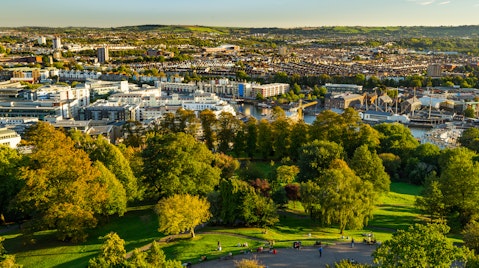Bristol: a Living Wage city
Key learnings from Bristol's journey to Living Wage Place recognition

Bristol City Council
Claire Herbert-Golden (Economic Inclusion Lead) and Hannah Shackleford (Mayor's Policy Advisor)

Bristol City Council
Claire Herbert-Golden (Economic Inclusion Lead) and Hannah Shackleford (Mayor's Policy Advisor)

In this interview with the IGN team, Claire Herbert-Golden (Economic Inclusion Lead) and Hannah Shackleford (Mayor's Policy Advisor) from Bristol City Council share their experience and offer key learnings from leading Bristol's journey to gaining Living Wage Place recognition.
Why was it important for Bristol to pursue Living Wage Place recognition as a lever for delivering local inclusive growth?
Bristol holds one of the most educated workforces in the county, has thriving aerospace, creative and tech sectors, and a seemly progressive culture. Yet 1 in 6 people are living on very low incomes and we are the least affordable core city with housing costs almost 9 times average income. We have a Mayor who experienced these inequalities first hand growing up in the city and who was elected on a ticket to make Bristol fairer and more inclusive.
Achieving Living Wage City recognition sends a signal about the kind of place we want to be. The journey to Living Wage Place recognition involves bringing stakeholders together to set goals and deliver change. In Bristol, our One City approach, championed by Mayor Marvin Rees, recognises the limitations of what the council alone can achieve and speaks to a new form of city governance.
Moreover, as a city that is growing - attracting not only people, but jobs and investment - we are mindful of the need to ensure the benefits of this are distributed more evenly than they have been in the past. Supporting a responsible business community is at the heart of that.
What key challenges has Bristol faced in the journey to becoming a recognised Living Wage City and how are these challenges being addressed?
An initial challenge for anywhere considering becoming a recognised Living Wage Place is identifying and bringing together employers who will lead the way in gaining individual accreditation, then work together to inspire others. This was mitigated once we formed an Action Group alongside some widely recognised organisations such as the University of Bristol, the TUC, Triodos Bank and the Soil Association. Through regular Action Group meetings, Bristol City Council and TUC provide the strategic link to the One City Board, expertise in stakeholder work and resources to support running the initiative.
Equally, since there is no upfront financial incentive to join the living wage movement, another challenge is to influence and persuade through example. The visibility of Action Group members is vital to this.
Promotional work is complemented by one-to-one conversations with employers in target sectors, underpinned by tailored business cases informed by sectoral analysis making the case that paying the living wage makes financial sense for employers.
What impact has becoming a recognised Living Wage Place had on Bristol so far?
Within the first two years of the Bristol Living Wage City initiative over 2,300 people have been uplifted to the Living Wage. This translates to an addition £1.54 an hour for a 21-year-old earning the statutory living wage.
This was achieved by doubling the number of Living Wage employers in Bristol to over 125. An additional 16,000 employees now work for employers which assure pay rises in line with living costs. In this respect, Bristol Living Wage City is directly making an impact on the pay packets and lives of thousands of Bristol people and in turn making our city a fairer and more inclusive place.
What advice would you give to other local/combined authorities who are considering the benefits of pursuing Living Wage Place recognition?
Key to our success has been our flexibility. We’ve been willing to bring new people in and review the sectors and organisations we’re targeting in light of events, such as Covid.
Crucially, having political support will lend you the platform and the influence to connect with the right stakeholders. We’ve kept the Mayor, but also partners through our City Office involved, meaning they can promote our work and spread the message; even just a passing comment from the Mayor in a meeting of city leaders has more of an impact that you realise.
Finally, be persistent! It may feel like slow progress at times, but the approach does deliver results, as we’ve seen in Bristol.
Bristol City Council is one of 14 members of the Inclusive Growth Network.
Resource Hub
Browse our resource library to find what inclusive growth looks like in practice and how it is benefitting people and places across the UK








